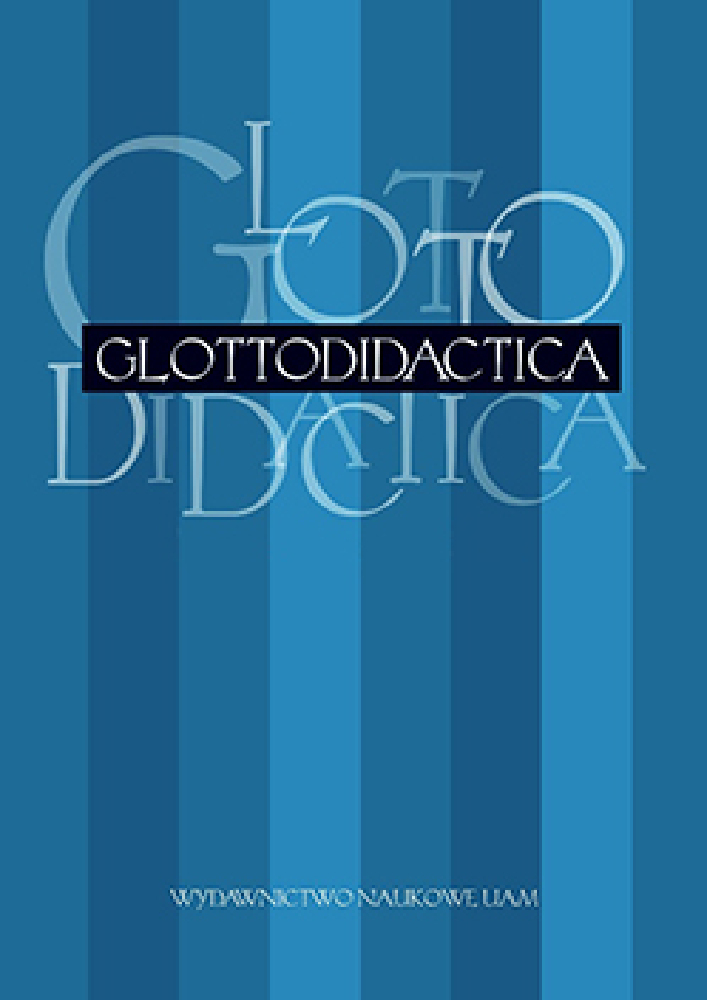Résumé
The article discusses some basic notions related to intercultural foreign language teaching. These include: intercultural communication competence, intercultural teaching, and intercultural training. The article also presents the results of research allowing an overview of the status quo of interculturality from the perspective of Polish teachers of the German language. The research is of a very general nature as it was supposed to counterbalance numerous operationally detailed surveys and provide data on to what extent the teachers understand interculturality as a general guideline in teaching German as a foreign language.
Références
Aleksandrowicz-Pędich, L. 2005. Międzykulurowość na lekcjach języków obcych. Bialystok: Wydawnictwo Uniwersytetu w Białymstoku.
Bennett, M. 1993. Towards ethnorelativism: A developmental model of intercultural sensivity. In: R.M. Paige (Hrsg.). Education for the intercultural experience. Yarmouth: Intercultural Press, 27-71.
Doye, P. 1994. Interkulturelles Lernen im Fremdsprachenunterricht. In: Bausch, K.R./Christ, H./ Krumm, H.-J. (Hrsg.). Interkulturelles Lernen im Fremdsprachenunterricht, Arbeitspapiere der 14. Frühjahrskonferenz zur Erforschung des Fremdsprachenunterrichts. Tübingen: Narr, 43-45.
Edmonson, W. 1994. Was trägt das Adjektiv „interkulturell“ zu unserem Verständnis vom Lernen im Fremdsprachenunterricht bei? In: Bausch, K.-R. (Hrsg.). Interkulturelles Lernen im Fremdsprachenunterricht. Tübingen: Gunter Narr, 85-89.
Van Ek, J.A. 1986. Objectives for Foreign Language Learning. Strasbourg: Council of Europe.
Fennes, H./ Hapgood, K. 1997. Intercultural learning in the classroom. Crossing borders. London: Cassel.
Flechsig, K.-H. 1998. Methoden interkulturellen Trainings. In: Flechisg, K.-H. (Hrsg.). Materialien zum interkulturellen Training. Göttingen: Institut für Interkulturelle Didaktik, 1-20.
Flechsig, K.-H. 2006. Beiträge zum Interkulturellen Training. Göttingen: Institut für Interkulturelle Didaktik.
Gardner, G.H. 1962. Cross-cultural communication. In: Journal of Social Psychology, 8, 241-256.
Gogolin, I. 1994. Der monolinguale Habitus der multilingualen Schule. Münster / New York: 2008.
Gudykunst, W.B./Hammer, M.R. 1983: Basic Training Design: Approaches of Intercultural Training. In: Landis, D./Brislin, R.W. (Hrsg.). Handbook of Intercultural Training. New York: Pergamon, 118-154.
Hall, E. 1984. Poza kulturą. Warszawa: PWN.
Hanvay, R. 1979. Cross – Culture Awareness. In: Smith, E.C./Luce, L.F. (Hrsg.). Toward Internationalism: Reading in Cross Culture Communication. Rowley, MA: Newbury House, s. 46-56.
Hoopes, D.S. 1979. Intercultural Communication Concepts and the Psychology of Intercultural Experience. In: Pusch, M.D. (Hrsg.). Multicultural Education. A Cross Cultural Training Approach. Yarmouth, ME: Intercultural Press, 9-39.
Kim, Y.Y. 1988. Communication and Cross-Cultural Adaptation. New York: Multilingual Matters.
Klopf, D. 2001. Intercultural encounters. Colorado: Morton Publishing.
Komorowska, K. 1999. Metodyka nauczania języków obcych. Warszawa: WSiP.
Königs, Frank G. 1994. Schillernd, aber spannend: Überlegungen zum Begriff des Interkulturellen Lernens. In: Bausch, K.-R./ Christ, H./ Krumm, H.-J. (Hrsg.). Interkulturelles Lernen im Fremdsprachenunterricht, Arbeitspapiere der 14. Frühjahrskonferenz zur Erforschung des Fremdsprachenunterrichts. Tübingen: Narr, 101-108.
Lewicki, R. 2002. Poznaj język sąsiada. Program nauczania – język niemiecki. Warszawa: Wydawnictwo Szkolne PWN.
Liddicoat, A.Z. 2003. Teaching Languages for Intercultural Communication. In: Berkley Language Centre Newsletter, 19, 1-17.
Moran, P. 2001. Teaching culture: Perspectives in Practice. London: Heinle&Heinle.
Paige, R.M. 1993. Education for the intercultural experience. Yarmouth ME: Intercultural Press.
Pusch, M. 1994. The chameleon capacity. In: Lambert, R.D. (Hrsg.). Educational exchange and global competence. New York: Council of International Educational Exchange, 205-210.
Skowronek, B. 2014. Glottodidaktik und Fremdsprachenunterricht in der Diskussion. Poznań: Wydawnictwo Naukowe.
Wiseman, R.L. 2002. Intercultural communication competence. In: Gudykunst, W.B. / Mody, B. (Hrsg.). Handbook of International and Intercultural Communication. Thousand Oaks: Newbury Park, 207-224.
Zawadzka, E. 2004. Nauczyciele języków obcych w dobie przemian. Kraków: Oficyna Wydawnicza „Impuls“.
Licence
© Magdalena Białek 2015

Ce travail est disponible sous licence Creative Commons Attribution - Pas de Modification 4.0 International.
Auteurs
Les auteurs de textes acceptés pour publication dans la revue Glottodidactica sont tenus de remplir, signer et renvoyer à l'adresse de la rédaction, un accord sur l'octroi d'une licence gratuite pour les œuvres, avec obligation d'accorder une sous-licence CC.
Conformément à cet accord, les auteurs des textes publiés dans la revue Glottodidactica accordent à l'Université Adam Mickiewicz de Poznań une licence non exclusive et gratuite et autorisent l'utilisation de la sous-licence Creative Commons Attribution-NoDerivatives 4.0 International (CC BY-ND 4.0).
Les auteurs se réservent le droit de disposer librement de l'œuvre.
Utilisateurs
Les utilisateurs d'Internet intéressés ont le droit d'utiliser les œuvres publiées dans la revue Glottodidactica depuis 2016, selon les conditions suivantes :
- Attribution – obligation de fournir, conjointement avec l'œuvre distribuée, des informations sur l'auteur, le titre, la source (lien vers l'œuvre originale, DOI) et la licence elle-même.
- Aucune modification – l'œuvre doit être préservée dans sa forme originale. Sans le consentement de l'auteur, il n'est pas possible de distribuer l'œuvre modifiée sous forme de traductions, publications, etc.
Les droits d'auteur sont réservés pour tous les textes publiés avant 2016.
Autres
L'Université Adam Mickiewicz de Poznań conserve les droits sur la revue dans son ensemble (mise en page, forme graphique, titre, conception de la couverture, logo, etc.).
A PARTIR DE L’ANNEE 2015, LES ARTICLES PUBLIÉS DANS LA REVUE SONT DISPONIBLES SOUS LICENCE CREATIVE COMMONS : https://creativecommons.org/licenses/by-nd/4.0/deed.fr




